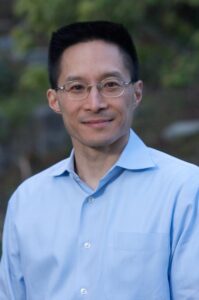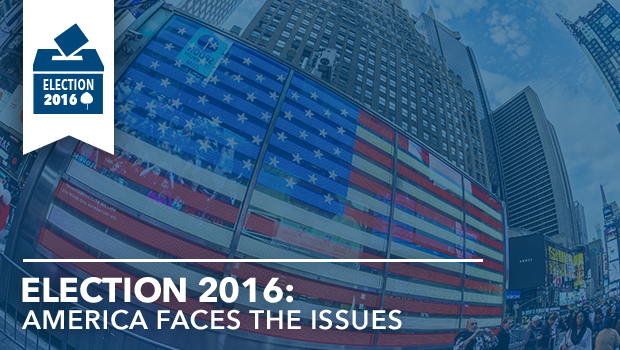The 2016 presidential election has been called a referendum on many things. On Donald Trump and his unprecedented campaign of calculated hate. On Hillary Clinton and the evils of corrupt establishment cronyism. On politics as usual. On rigged games. On decency in democratic life. On democracy itself and the rule of law.
But beneath all this is a deeper question the electorate will address in two weeks: Who is “us” now?
It is a referendum not on the past but on who we want to become – indeed, who we are already becoming.[/quote_embed]
This is an election about American identity in the 21st century. It is a referendum not on the past but on who we want to become – indeed, who we are already becoming.
That is a question about both demographics and economics. The tectonic demographic fact of life today is that a majority of Americans will be people of color within a generation. Indeed, this new America has already arrived – literally – among new births. In ways spoken and unspoken, Americanness and whiteness are delinking. Communities of color and women are rising in cultural visibility, political voice, and economic clout. White male Americans are no longer the default face of this country.
At the same time, economic opportunity has concentrated in ways not seen since before the Great Depression. The Obama Administration’s efforts both to raise the floor of wages and to make the wealthiest pay more in taxes have tempered but not fundamentally changed the course of the last four decades of structural inequality. Trade deals that accelerated globalization did send industrial jobs abroad. Median wages have been essentially stagnant since the 1970s.
As a result of these broad intersecting trends, our country is wracked by status anxiety – both cultural and economic.
Uneducated, lower-income whites feel the convergence of these trends acutely – they alone among Americans now face declining life expectancies. But many Latino, Asian, and Muslim immigrants feel (and are) under attack. Many African-Americans, rejecting a state that consumes black life disproportionately, are disrupting normal politics. Many white evangelicals are sticking with a candidate who lives by few of their moral values but who channels their sense of grievance and loss.
[quote_embed]In short, tens of millions of Americans – for often contradictory reasons – feel left out, left behind, or both. [/quote_embed]
In short, tens of millions of Americans – for often contradictory reasons – feel left out, left behind, or both. Trump and Bernie Sanders were each able to tap into these various forms of anxiety over the last year. But after Sanders lost in the primaries, economic inclusion receded as a theme in the general election. And as Trump’s campaign became increasingly – perhaps fatally – defined by his own words of bigotry and misogyny, social inclusion got defined dramatically downward.
Lost in this campaign, then, was any in-depth reckoning with the transitions of our time and our changing national narratives. But maybe we don’t need that. Maybe this is a moment when two sharply contrasting slogans – “Make America Great Again” and “Stronger Together” – say it all, or at least say enough. And maybe it should be less about the candidates and more about us and our ability to name our fears and hopes.
In the end, this election is not the end. It is only a milepost in a long struggle to define American identity. Who is us? Which “we” gets to write the new narrative of “We the People?” Will we be a country defined by a prideful multicultural elite that thinks it knows best? By resentful middle- and low-income whites who feel they have no control over their own lives? By nonwhites who no longer will defer their dreams of justice?
Or by people of all colors, faiths, and classes who decide to recommit to a common civic creed?
[quote_embed]We are going to have to rediscover a common language. A way of talking to each other across economic and cultural gaps.
We can’t know. We can only do. In the midst of the contests still to come – contests that will unfold not on the presidential ballot but in our classrooms and community centers and churches every day – we are going to have to rediscover a common language. A way of talking to each other across economic and cultural gaps. A set of shared references as a basis for empathy and simple understanding.
That’s why my program at the Aspen Institute is running a project called What Every American Should Know – a nonpartisan exploration of the elements of cultural, civic, and social literacy for our increasingly diverse nation. We’ve taken this conversation to campuses and public libraries across the country. It’s also why Aspen’s commitment to national service – creating shared experiences that enable people of divergent backgrounds to solve problems together – matters so much.
And it’s why whichever candidate prevails on November 8, the task for citizens of the United States on November 9 will be to act like citizens of the United States: Members of the body, committed to the Union, and willing to try new ways to include more people into the structure of power, respect, and recognition.
Eric Liu is executive director of the Aspen Institute Citizenship & American Identity Program.
America Faces the Issues



